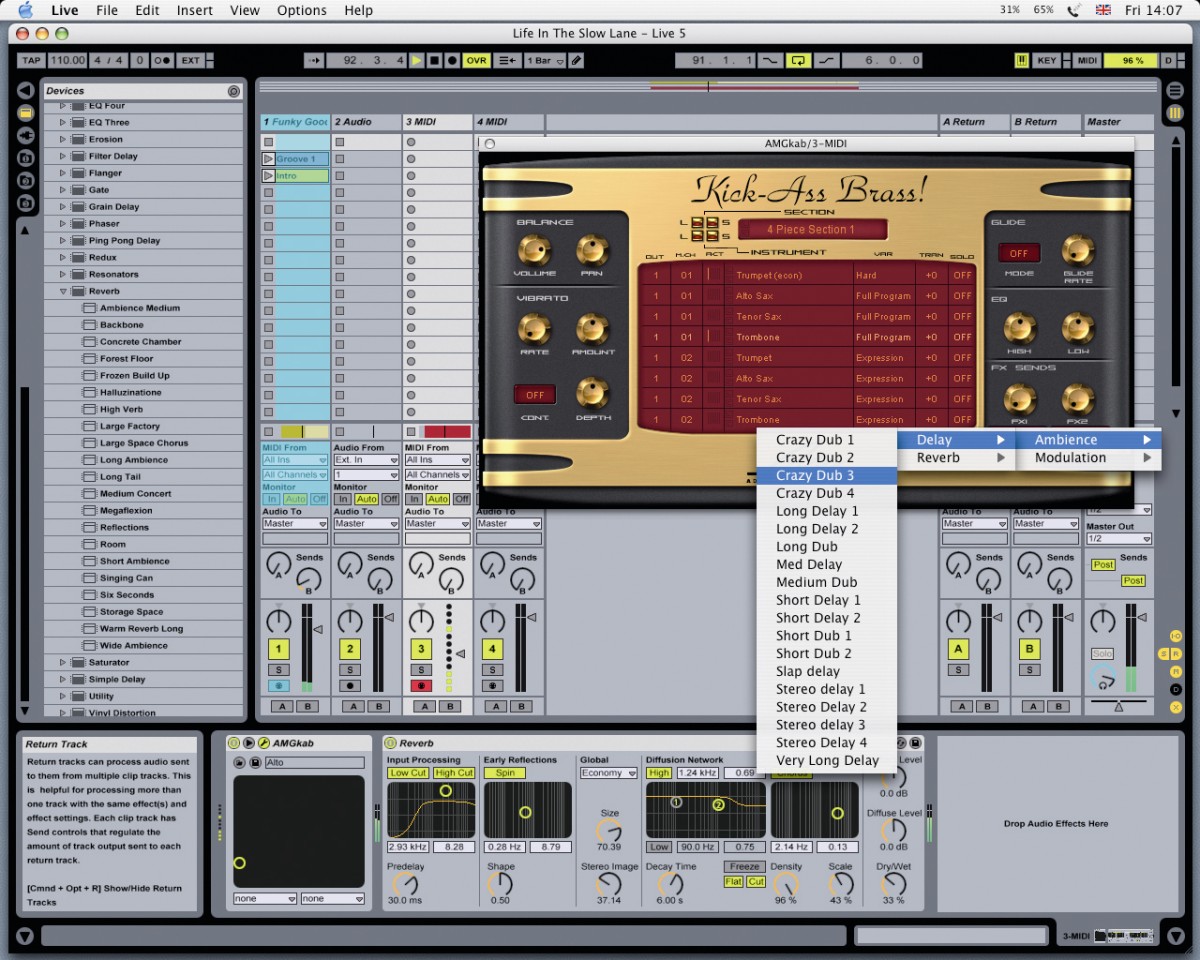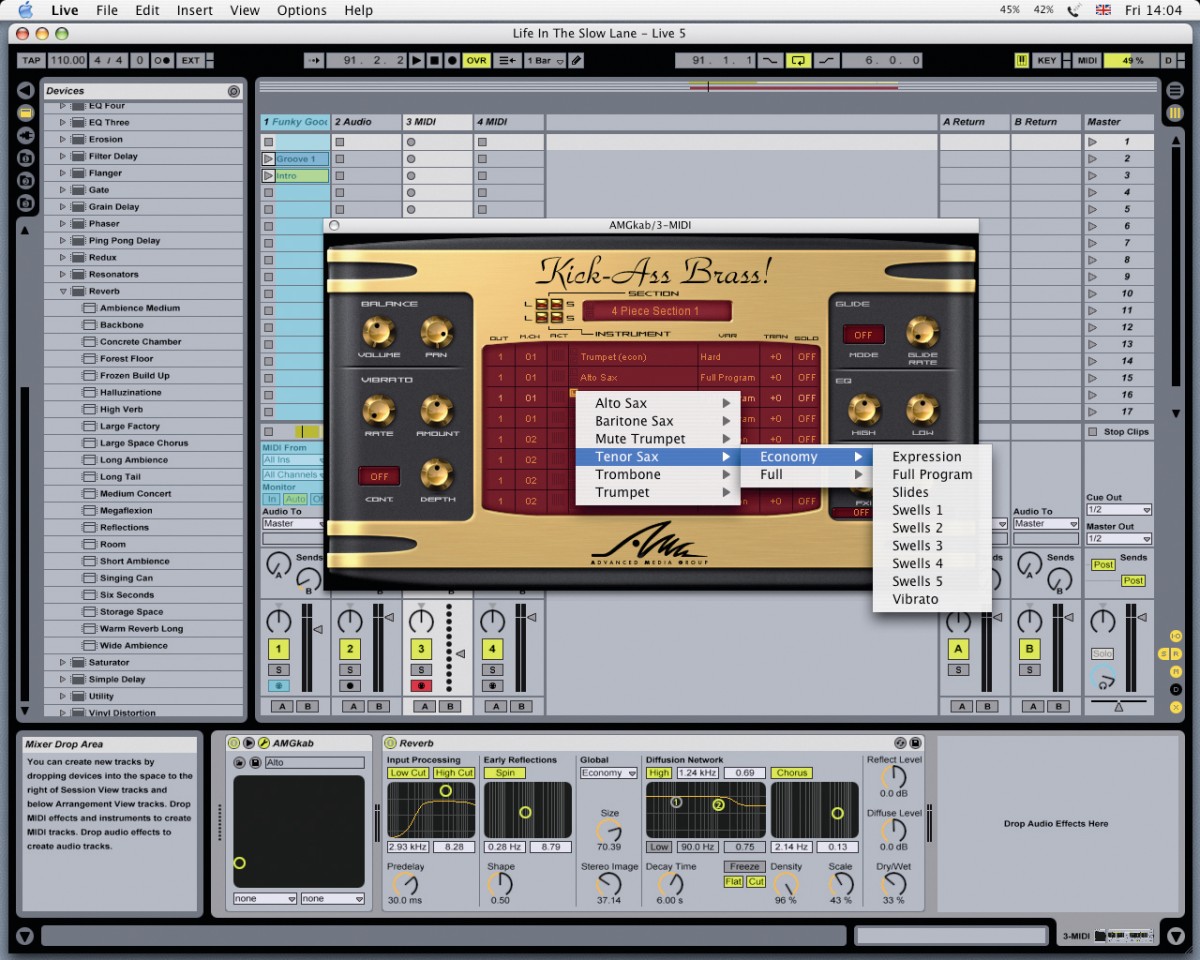MusicRadar Verdict
If it's top-drawer brass sounds you're after Kick-Ass Brass! should be on your shortlist.
Pros
- +
Sounds excellent. Tidy GUI.
Cons
- -
Restrictive license key encryption. Power hungry. Not cheap.
MusicRadar's got your back

AMG-KickAssBrass

AMG-KickAssBrass
After starting life as a widely acclaimed sample library CD, AMG's Kick-Ass Brass! has now metamorphosised into a virtual instrument, bringing its superb modern brass section to any VST or AU-compatible sequencer.
First impressions
The appropriately brass-themed GUI is clean and stylish and centres around the main sampler-style data window, where instruments are selected and loaded.
Surrounding this is a handful of additional controls: balance, volume, pan, vibrato rate, glide and EQ. These, and many other aspects of the plug-in, are MIDI controllable.
However, before you can actually use it, you must first register Kick-Ass Brass! with AMG, as the 670Mb sound library requires a license key for decryption.
Therefore, the library is only licensed to one computer - you can't simply copy the sounds from your desktop to a laptop: each machine needs a unique key.
Instruments
Kick-Ass Brass! is both multi-timbral and multi-output, meaning four stereo pairs will appear as mixer channels in the host software.
Six instruments await your windy pleasure: the original CD's trumpet, trombone, alto and tenor saxophone, newly augmented by baritone sax and muted trumpet.
Want all the hottest music and gear news, reviews, deals, features and more, direct to your inbox? Sign up here.
Up to eight instruments or variations can be loaded in one instance. This means that either a complete four-piece horn section or all of the playing styles of a single instrument can be contained in just one plug-in.
Each slot can also be assigned a separate MIDI channel for greater control over playback.
In use
At the head of the plug-in, you select either Instrument or Multi patches to load one of the supplied presets. Alternatively, clicking the small L (for Load) button in each slot opens a cascading list of all the instruments. Changing programs takes a few seconds - depending on complexity - but it's nothing interminable.
Each instrument loads pre-mapped to your MIDI keyboard and can only cover its natural range; you can't fake a tuba simply by dropping a trombone down a couple of octaves. However, each instrument can be transposed +/-12 semitones to imbue them with a slightly different timbre.
To the right of each instrument's name is the variation slot, covering such playing styles as Ends, Expression, Hard, Mixed Stabs, Rips + Falls, Slides, Soft, Swells, Trills and Vibrato. This gives each instrument superb flexibility and combining the variations results in a strikingly realistic performance.
With a touch of reverb and delay (several decent-sounding stereo 64-bit FX modules are supplied) the samples really come alive. You can also save instrument and section settings, so you can easily create unique set-ups.
Power
So, Kick-Ass Brass! sounds fantastic - what's the catch? In a word: power. Kick-Ass Brass! craves it like Robert Mugabe ego-tripping during election week.
You'll need a fast computer stuffed with speedy RAM to run multiple instances in real time or you'll be bouncing audio and freezing tracks on a regular basis.
In fairness, this problem goes with virtual instrument territory like ham goes with eggs, and economy versions of each Kick-Ass Brass! instrument are supplied for those with feebler computers.
Also, it would be great to see more orchestral brass included - French horns, tubas, more trumpets etc - as this would round out the collection nicely, especially given the quality of the current content.
We did raise a slight eyebrow at the price, though - £200 sounds a lot more expensive than its competitors.
Conclusion
Saxophones and trumpets might not be top of everyone's musical wishlist, but if you're in the market for some top-notch modern brass sounds, they don't come much sweeter than this. The user-friendliness of Kick-Ass Brass! scores highly for us and its sound is simply stellar.
Future Music is the number one magazine for today's producers. Packed with technique and technology we'll help you make great new music. All-access artist interviews, in-depth gear reviews, essential production tutorials and much more. Every marvellous monthly edition features reliable reviews of the latest and greatest hardware and software technology and techniques, unparalleled advice, in-depth interviews, sensational free samples and so much more to improve the experience and outcome of your music-making.
